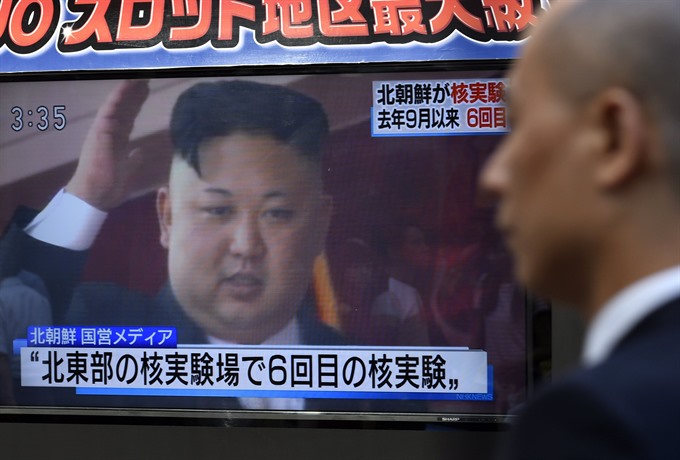 World
World

North Korea said Sunday that it has successfully conducted a test of a hydrogen bomb that can be loaded into its intercontinental ballistic missile (ICBM) in its most powerful nuclear detonation yet.
 |
| A pedestrian walks past a TV screen on a street in Tokyo, Japan, displaying North Korean leader Kim Jong-un after North Korea proceeded to a nuclear test on September 3. North Korea announced it has conducted to its sixth nuclear test by detonating a hydrogen bomb that can installed in an ICBM. - EPA/VNA Photo |
SEOUL — North Korea said Sunday that it has successfully conducted a test of a hydrogen bomb that can be loaded into its intercontinental ballistic missile (ICBM) in its most powerful nuclear detonation yet.
In an "important" announcement, North Korea said that it carried out the sixth nuclear test at 12:00pm (Pyongyang Time), calling it a "perfect" success.
The announcement came hours after an artificial earthquake with a 5.7 magnitude was detected near North Korea’s nuclear site in the northeastern area.
"The H-bomb test was carried out to examine and confirm the accuracy and credibility of the power control technology, and internal structural design newly introduced into manufacturing the H-bomb to be placed as the payload of the ICBM," the Korean Central News Agency said.
It marks North Korea’s sixth nuclear test since 2006 including two detonations last year.
Earlier in the day, North Korea claimed that it has developed a hydrogen bomb that can be mounted on an ICBM.
The provocation came amid heightened tensions after North Korea tested two ICBMs in July. Analysts said the ICBM tests could put much of the US mainland within range, including Los Angeles and Chicago.
In January 2016, North Korea conducted its fourth nuclear test, which Pyongyang claimed to be a test of a hydrogen bomb. Outside experts said that it appeared to be a test of a boosted fission weapon, rather than an H-bomb.
South Korea’s weather agency said Sunday that the latest blast was five to six times more powerful that the North’s fifth test in September 2016. The explosion a year ago, presumably with a yield of 10 kilotons, triggered a 5.04 magnitude earthquake.
Sunday’s test was 11 times more destructive than its fourth test, it said.
"(The success) also marked a very significant occasion in attaining the final goal of completing the state nuclear force," the KCNA said.
The latest test seemed to bring North Korea a step closer to the goal of developing a nuclear-tipped ICBM capable of reaching the continental US.
Along with the miniaturisation of a nuke weapon, obtaining atmospheric re-entry technology is a key element in developing an ICBM, which analysts said the North may be a few years from achieving.
"The sixth nuke test indicates that North Korea is pushing for dealing with the US on equal footing after securing a nuclear status," said Yang Moo-jin, a professor at the University of North Korean Studies.
The provocation is expected to prompt the international community to seek tougher sanctions and pressure. Pyongyang is already under a set of UN sanctions for its nuke tests and missile launches.
South Korean President Moon Jae-in ordered the pursuit of the most powerful sanctions on North Korea with the international community.
Tensions flared up between the US and the North after the ICBM tests with US President Donald Trump earlier warning of "fire and fury" against the North.
Pyongyang threatened to fire a salvo of missiles into waters near the US territory of Guam though it held off on the plan later.
The US offered a conciliatory gesture toward the North, but Pyongyang responded with the firing of an intermediate-range ballistic missile over Japan last week. Trump said dialogue with the North was "not the answer."
Moon is expected to be dealt a heavy blow in his push for rapprochement with Pyongyang. He is seeking a dual-track approach of dialogue and sanctions in resolving North Korea’s nuclear issue.
He earlier said that North Korea would be crossing a "red line" if it weaponises a nuclear-tipped ICBM. — YONHAP




